|
|
|
Sort Order |
|
|
|
Items / Page
|
|
|
|
|
|
|
| Srl | Item |
| 1 |
ID:
152893
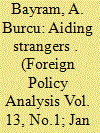

|
|
|
|
|
| Summary/Abstract |
Why do publics in donor countries support development foreign aid? Focusing on material factors, ideology, and identities, the literature has largely neglected the moral basis of foreign aid attitudes. I argue that generalized trust, defined as the belief in the integrity and trustworthiness of people, is a crucial component of the moral calculus of publics in donor countries. Using data from independently conducted surveys of global (World Values Survey) and American mass publics (Core Values Project Survey), I show that generalized trusters are more likely to aid the have-nots of the world than those who lack trust in people. This finding indicates that the bonds of trust expand the boundaries of global justice. By illuminating the role generalized trust plays in shaping donor public attitudes towards development foreign aid, this study helps improve the political economy, ideology, and identity models of aid, contributing to the literatures on foreign aid and foreign policy attitudes, and to theories of cosmopolitan global justice.
|
|
|
|
|
|
|
|
|
|
|
|
|
|
|
|
| 2 |
ID:
152887
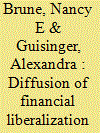

|
|
|
|
|
| Summary/Abstract |
Over the past three decades, many developing countries have liberalized their capital accounts. Recent studies suggest that these policy changes were interdependent and diffused through networks of peers. This article strengthens the literature on the diffusion of financial liberalization in several ways. Theoretically, we distinguish between concrete and more amorphous causal processes by which policies are diffused. We argue that networks vary by degree of interdependence, structure, and self-selection and hypothesize that diffusion of liberalization policies is more likely across networks that are more structured, interdependent, and self-selected, such as regional integration agreements (RIAs). Empirically, we employ both an aggregate measure of openness as well as a policy-to-policy measure of capital control transmission. Based on panel data for 114 emerging economies over 1973–2002, we replicate the finding of multiple diffusion processes using the aggregate measure, but find these results are substantially weaker using the policy-to-policy measure. Of all the networks tested, RIA networks were the most robust to different models and measurement.
|
|
|
|
|
|
|
|
|
|
|
|
|
|
|
|
| 3 |
ID:
152896


|
|
|
|
|
| Summary/Abstract |
Existing studies argue that armed conflict reduces foreign direct investment (FDI) or, following rational expectations theory, should not affect FDI. In this paper, I offer a new theory on how armed conflict affects FDI, which encompasses the interaction between political risk and market conditions and provides a systematic explanation for investors’ divergent responses including an opportunistic behavior. To do so, I present a formal model focusing on a commodity's price, which is a key to investors’ profits and is also influenced by political risk. The model demonstrates that investors do not necessarily reduce FDI against political risk if armed conflict is expected to increase profit by increasing commodity prices, ceteris paribus. Statistical analysis of 50 countries that received FDI in the petroleum sector from 1980 to 2006 reveals that armed conflict (intrastate and interstate) reduces FDI in petroleum. However, it also shows that the effect of armed conflict on FDI in petroleum varies depending on oil prices. Consistent with the predictions, I find that investors do not decrease investment as oil prices get higher. An additional analysis on US FDI in petroleum from 1982 to 2006 also confirms the finding. This insight adds a new dimension to a current debate about the relationship between conflict and FDI.
|
|
|
|
|
|
|
|
|
|
|
|
|
|
|
|
| 4 |
ID:
152897
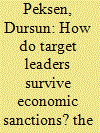

|
|
|
|
|
| Summary/Abstract |
What domestic policies do targeted regimes pursue to survive economic sanctions? Despite an abundance of research on the use and effectiveness of sanctions, scant research has been conducted on the domestic sources of the target's defiance to foreign pressure. This study explores the extent to which sanctions prompt the target regime to manipulate the domestic economic conditions through arbitrary confiscation and redistribution of private property and wealth. It is argued that economic coercion as a direct threat to political survival and coercive capacity of the target government creates incentives for politically insecure elites to engage in the policy of predation to counter the negative economic effects of the coercion on themselves and their constituency. Using time-series cross-national data from 1960 to 2005, the results indicate that as sanctions exact significant economic damage on the economy, the target government is more likely to pursue predatory policies. Further, the suggested impact of sanctions on property rights abuses does not appear to be conditioned by political regime type of the target and the involvement of the United States or multiple countries in the imposition of sanctions. Focusing on the government use of predatory policies to evade foreign pressure, this study expands the current understanding of sanction ineffectiveness in pressuring the government to acquiesce to external demands. It also shows that one major inadvertent consequence of sanctions is the deterioration of the economic security and private property rights of citizens in target countries.
|
|
|
|
|
|
|
|
|
|
|
|
|
|
|
|
| 5 |
ID:
152892


|
|
|
|
|
| Summary/Abstract |
This paper is designed to understand the relationship between states and nongovernmental organizations (NGOs), especially foreign aid policy and the field activities of NGOs. In this study, I argue that NGOs influence states’ foreign aid policy behaviors toward other states directly, functioning as information providers and lobbying groups. By applying theoretical arguments to the field of international development, the influence of NGOs on states’ decisions about foreign aid is analyzed with the case of the United States. A new time-series cross-sectional data set of the activities of US-based NGOs in developing countries is constructed. This study shows that as the number of US-based NGO field operations in developing countries increases, that country is significantly more likely to receive higher amounts of aid from the United States. NGOs that have longer operations in developing countries are also more effective at lobbying the United States to provide more foreign aid.
|
|
|
|
|
|
|
|
|
|
|
|
|
|
|
|
| 6 |
ID:
152890
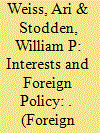

|
|
|
|
|
| Summary/Abstract |
In this article, we test one explanation of the causes of adoption of destabilization as a foreign policy. Destabilization, a risky policy which targets the political leadership of another sovereign state, is a widely-used foreign policy practice. But under-conceptualization, specifically around the causes of destabilization, has thus far limited its use in scholarly analysis of foreign policy. This paper aims to remedy that deficiency. Building on Taliaferro's (2004) balance-of-risk theory, we examine the rapid decay and adoption of destabilization in relations between the US and Cuba as a critical empirical test of this theory. We argue that the risky decision to adopt destabilization is the result of perceived crisis of security, economic and ideological interests. Our findings have implications for other scenarios and times, because they provide a better understanding of destabilization as a practice of governments against one another.
|
|
|
|
|
|
|
|
|
|
|
|
|
|
|
|
| 7 |
ID:
152889


|
|
|
|
|
| Summary/Abstract |
This study investigates how interindustry goods market networks influence industry lobbying as foreign firms' direct investment and local production increase in the United States. The goods market networks consist of each sector's procurement of inputs from other sectors and the sectoral destinations of its outputs. I found that domestic upstream sectors modify their lobbying in ways dissimilar to those of downstream sectors when foreign firms' local production and sales increase. Upstream sectors lobby more when US affiliates of foreign firms that procure inputs from their own supply chains gain market share at the expense of domestic firms in investment-receiving sectors. In contrast, downstream sectors lobby less when they save input procurement costs as domestic and foreign firms compete to produce quality goods at a lower price. The empirical results imply that goods market networks provide another theoretical framework, in addition to that provided by factor or sector models, in the analysis of demand side of trade policy.
|
|
|
|
|
|
|
|
|
|
|
|
|
|
|
|
| 8 |
ID:
152888


|
|
|
|
|
| Summary/Abstract |
I develop a theory of spatial diffusion of the rule of law, where “space” is conceptualized as shared memberships in economic international organizations (IOs). I argue that the rule of law diffuses as a result of economic competition and socialization. Outside evaluators, such as international leaders, activists, and most importantly, international firms and investors, often assess states’ attractiveness as a business venue by comparing them to similar states. The natural reference group for such comparisons is not just geographical neighbors, but also states with shared memberships in economic IOs. Responding to this evaluation, states identify members of their own reference groups and view them as competition for investment. As a result, states within the same reference groups converge on issues related to lowering domestic economic risks, which are referred to by the umbrella term “domestic rule of law.” The resulting process of policy convergence is further aided by socialization. Socialization may involve emulation of policies of similar states or “active” learning through norm entrepreneurs, who use the reference groups for both evaluation and access to their target audiences. I capture the theorized spatial processes using a multiparametric spatiotemporal autoregressive model (m-STAR) and find support for the prediction.
|
|
|
|
|
|
|
|
|
|
|
|
|
|
|
|
| 9 |
ID:
152894


|
|
|
|
|
| Summary/Abstract |
Recent studies have hypothesized that the Chinese state has sought to use outward flows of foreign direct investment (FDI) to Latin America and Africa in order to promote broad national interests, including securing China's access to oil and other natural resources, and pressuring states to abandon diplomatic ties with Taiwan. To date, however, there has been little systematic empirical study of the influence of these factors on Chinese FDI. In this study, we attempt to fill this gap in the literature. Utilizing a cross-sectional time-series data set for 66 countries for the period of 2003–2010, we investigate the effects of various economic and political variables on Chinese FDI in Latin America and Africa. We find that Chinese FDI is influenced by trade flows and natural resources in host economies, including oil resources and ores and metals, while also being directed to markets with lower per capita income. In addition, the study adds to the prior literature by demonstrating empirically that Chinese FDI flows are negatively associated with recipients who maintain diplomatic recognition of Taiwan. The analysis also suggests that, with the exception of natural resources (oil), there is little overlap in the determinants of Chinese and US FDI.
|
|
|
|
|
|
|
|
|
|
|
|
|
|
|
|
| 10 |
ID:
152898
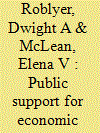

|
|
|
|
|
| Summary/Abstract |
What are the determinants of public support for the government’s foreign policy? We shed light on this question using experiments investigating public support for economic sanctions. Our results suggest that humanitarian concerns are associated with individuals’ decisions to support the use of sanctions against a target country. We find that high levels of public pain in the target country have a negative relationship with the likelihood of supporting sanctions, and tailored sanctions, which aim to shift damage from the targeted country’s population to its leadership, have a higher probability of support than comprehensive sanctions. At the same time, policy effectiveness shapes public support, but only indirectly—through individuals’ subjective evaluations rather than given estimates of policy success. When subjective evaluations of effectiveness are higher, sanctions receive more public support. Recalled effectiveness, on the other hand, has no direct effect on the decision to support the sanction policy.
|
|
|
|
|
|
|
|
|
|
|
|
|
|
|
|
| 11 |
ID:
152895
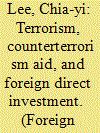

|
|
|
|
|
| Summary/Abstract |
Foreign investors generally refrain from entering countries with high political risks. As an often seen type of political risk, terrorism may deter foreign investors by creating an unsafe investment environment. This paper explores whether terrorism reduces foreign direct investment (FDI) inflows and argues that foreign investors adjust their information by observing whether the host country has the capability to deal with terrorism. Foreign aid from the United States used specifically for counterterrorism is an effective signal of a recipient's counterterrorism potential. Using two commonly used terrorism data sets and drawing upon a time-series cross-sectional data analysis, this paper finds that while terrorism can be an obstacle to FDI inflows, countries that receive more counterterrorism aid are less vulnerable to this adverse effect. It also shows that conflict-tied aid mitigates the negative effect of terrorism on FDI because it sends a similar signal to foreign investors.
|
|
|
|
|
|
|
|
|
|
|
|
|
|
|
|
| 12 |
ID:
152891
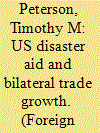

|
|
|
|
|
| Summary/Abstract |
Previous research demonstrates that the decision to issue international disaster aid depends in part on the political relationship between donor and recipient countries. However, the reverse case—the impact of disaster aid on subsequent relationships—remains largely unexamined. In this paper, I argue that disaster aid promotes reconstruction, reduces investors’ risk perception, and improves disaster victims’ perceptions of the donor state. Together, these factors suggest a subsequent increase in trade between donors and disaster victims. I use error correction models (ECMs) to assess the short- and long-term influence of US disaster aid on trade growth over the 1973–2008 period. My results suggest that an increase in disaster aid often leads to a subsequent increase in bilateral trade considerably larger than the initial aid commitment. I also find, controlling for other determinants of disaster aid, that preexisting trade with the United States is not associated with a victim’s likelihood of receiving US aid. My findings are important for policymakers, suggesting the presence of a material incentive to complement humanitarian imperatives to grant disaster assistance.
|
|
|
|
|
|
|
|
|
|
|
|
|
|
|
|
|
|
|
|
|